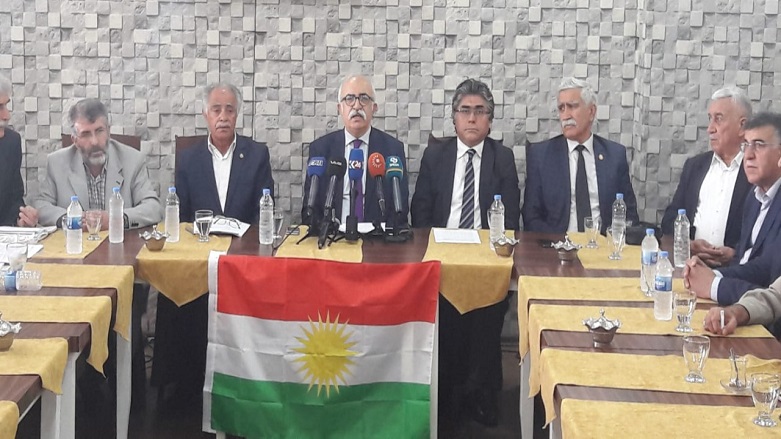Pushed aside by Turkey opposition, Kurdish parties seek third way

DIYARBAKIR/ANKARA (Kurdistan 24) – Five Kurdish political factions in Turkey on Wednesday announced an alliance in the run-up to the country’s upcoming snap general and presidential elections in a bid to secure Kurdish rights as a common front.
The move came a day after major opposition parties struck a deal in the absence of any Kurdish party to unite against the alliance of President Recep Tayyip Erdogan’s ruling Justice and Development Party (AKP) and its far-right ally, the Nationalist Movement Party (MHP).
For weeks, Turkish pundits and media were speculating if the main opposition Republican People’s Party (CHP) would seek support from the pro-Kurdish Peoples’ Democratic Party (HDP) to counter Erdogan’s ambitions for a more powerful presidency that circumvent parliamentary check and balances.
The CHP, however, did not involve the HDP in its anti-Erdogan pact which it formed with the ultranationalist IYI Party and the Islamist Felicity Party, mainly due to the Erdogan administration’s effective criminalization of the second-largest opposition bloc through an ongoing crackdown in the framework of “counter-terrorism” measures.
Azadi Movement, Kurdistan Freedom Party (PAK), Kurdistan Socialist Party (PSK), Kurdistan Democratic Party-Turkey (PDK-T), and Platform for the Democrats of Kurdistan released a statement during a press conference in Diyarbakir, outlining their goals.
Leaders of the said small factions, among them only PAK being legally recognized as a party, revealed they intended to sit down in the coming days with HDP officials to include it in what they named the “Kurdistani alliance.”
None of the factions leading the alliance can participate in the elections, as they fail to meet criteria set by Turkey’s Supreme Electoral Council.
By uniting with HDP, they hope to have their voices represented at the Parliament and consolidate as many votes as possible for a broadest Kurdish consensus in the June 24 polls.
During an interview with Kurdistan 24 in Ankara, HDP’s Spokesperson Ayhan Bilgen made no comment about the calls on his party by other Kurdish sides.
But he said the Turkish opposition was sidelining the Kurdish people during a critical phase in the NATO-allied nation’s history.
“The opposition should be able to put out a different agenda if it claims to be different than the ruling party,” Bilgen said, arguing the CHP and its junior allies proved to share the same anti-Kurdish sentiments fanned by the AKP and MHP.
Bilgen reminded that the Turkish opposition backed the government’s anti-Kurdish policies in Iraq and Syria to disrupt Kurdish aspirations for self-rule or independence.
“Which shows us, there remains only one way: that [Turkey’s] Kurds need to form their unity, solidarity, and voice to make their existence felt through the ballot box,” he said.
The Kurdistani alliance said they wanted to pressure Turkey to constitutionally recognize the Kurds as a people and their right to self-rule, two points constituting the basis of an on and off conflict continuing since the foundation of the Western-allied country.
They also said the Ankara government had to lift all bans on the Kurdish dialects and accept Kurdish on par with Turkish as an official language of the republic.
Fully committing to the freedom of expression, association, and assembly, recognizing other ethnic and religious minority’s rights, and advancing women’s rights on the basis of positive discrimination were among other demands the Kurdistani alliance said it would push for.
Editing by Karzan Sulaivany
(Kurdistan 24 correspondents in Ankara and Diyarbakir contributed to this report)
